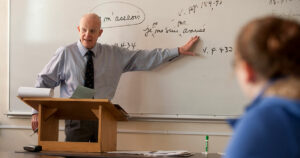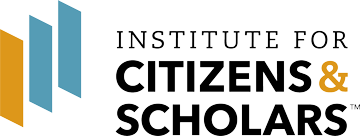Heroes Like You
Who makes our mission possible? Heroes like you.
Being a hero doesn’t require rushing into a burning building to save lives. The definition is a bit broader than that and requires only the selfless attempt (and intent) to benefit others through some amount of personal sacrifice. When you give your assets to support our mission, you become a hero—at least to those whose lives are changed through our programs and fellowships.
What does a hero look like? Consider how one of our supporters has changed lives and helped us continue to impact others.
 Michael O’Donnell: How my Fellowship in 1966 Shaped a Lifetime of Gratitude and Giving
Michael O’Donnell: How my Fellowship in 1966 Shaped a Lifetime of Gratitude and Giving
Michael O’Donnell, a 1966 Woodrow Wilson Fellow who went on to become a professor and school administrator, recalls how his fellowship changed his life, shaped his career, and impacted his desire to give back.
“Midway through my undergraduate study, I was honored by the invitation to serve in the U.S. Peace Corps, in Morocco, North Africa,” recalls O’Donnell—known to generations of students and colleagues primarily as O’D. “Those were heady days under J.F.K and Peace Corps founder, Sargent Shriver.
“My Woodrow Wilson (WW) Foundation (’66) Board interview in Harrisburg, PA is still fresh in my mind. And following my Woodrow Wilson Fellowship award, I was living a dream. In my case, at least, the award proved serendipitous.
O’Donnell had considered a career in the U.S. Foreign Service, but the Academic Dean/Provost at Clinch Valley College (now UVA Wise) was so impressed seeing his name on the WW list of Fellows, he called to offer him a teaching position. O’D told him he’d try it for a year or two. That was 57 years ago!
“In those days,” O’Donnell said, “the Woodrow Wilson National Fellowship Foundation, now the Institute for Citizens & Scholars, only asked that recipients consider a career in college teaching. I’m still at that college. The reputation of the Fellowship was—IS—so prestigious that teaching and government offers continued for twice my salary and more. I never considered leaving.”
In addition to teaching, O’D served as an administrator when asked, including serving as Dean of Students and Director of Admissions. He got four months of vacation a year, which he and his wife regularly spent traveling the world.
O’Donnell notes that while the Institute for Citizens & Scholars programs and goals are now far more diverse, the well-established benefits to society are both laudable and visible.
“I’ve always felt I owe my life’s vocation to the generous people who funded my graduate study.
In my life, there has never been a question about expressing my gratitude for my Fellowship by including the Institute for Citizens & Scholars in our estate plans. While gratitude is necessary and admirable, giving back with a gift in my will completes the circle. That seemed the very least I could do to try to say thank you for a life of purpose and rewards beyond measure.”

